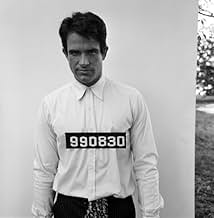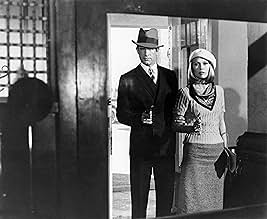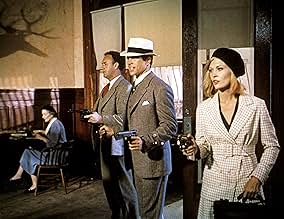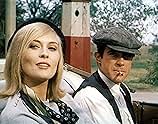A garçonete Bonnie Parker se apaixona por um ex-presidiário chamado Clyde Barrow e juntos iniciam uma onda de crimes violentos por todo o país, roubando carros e assaltando bancos.A garçonete Bonnie Parker se apaixona por um ex-presidiário chamado Clyde Barrow e juntos iniciam uma onda de crimes violentos por todo o país, roubando carros e assaltando bancos.A garçonete Bonnie Parker se apaixona por um ex-presidiário chamado Clyde Barrow e juntos iniciam uma onda de crimes violentos por todo o país, roubando carros e assaltando bancos.
- Direção
- Roteiristas
- Artistas
- Ganhou 2 Oscars
- 22 vitórias e 29 indicações no total
Martha Adcock
- Bank Customer
- (não creditado)
Harry Appling
- Bonnie's Uncle
- (não creditado)
Garrett Cassell
- Cop
- (não creditado)
Mabel Cavitt
- Bonnie's Mother
- (não creditado)
Patrick Cranshaw
- Bank Teller
- (não creditado)
Frances Fisher
- Bonnie's Aunt
- (não creditado)
Sadie French
- Bank Customer
- (não creditado)
Garry Goodgion
- Billy
- (não creditado)
- Direção
- Roteiristas
- Elenco e equipe completos
- Produção, bilheteria e muito mais no IMDbPro
Avaliações em destaque
Although numerous chapters in film manuals have been dedicated to Arthur Penn's violent, jagged, cynical "Bonnie and Clyde"--and, indeed, it kick-started a new permissiveness in American movies which then generated many imitations--the first 20 or so minutes of the picture are pretty awful. Depression-era waitress, bored and thrill-seeking, finds herself drawn to a smooth-talking, reckless hood, an ex-con who, when playfully dared to, robs a general store right in front of her. He's sexually impotent but does have a sympathetic heart for the unfortunates and the working class; she's a high-wire act, strictly amoral and greedy. Their initial meeting outside her house has all the conventions of a standard 1930s drama--and just because the movie's look is generally correct doesn't mean what's happening on the screen is original. Producer Warren Beatty and screenwriters Robert Benton and David Newman were inspired by the French New Wave in regards to the film's approach and style, and their efforts to duplicate the amoral feel of European films paid off (this is a good-looking picture shot by Burnett Guffey, who won an Oscar). However, Arthur Penn's direction isn't visionary, and the multiple car-riding shots with back projection don't seem to break new ground. The film's greatest achievement--aside from its textured look--is the casting: Beatty and Faye Dunaway do marvelous work in the leads; Gene Hackman and Estelle Parsons are also fine as Clyde's brother and sister-in-law (Parsons won the film's second of two Oscars as Best Supporting Actress); Michael J. Pollard is an amiable curiosity as partner C.W.; and there are dandy smaller bits by Denver Pyle, Dub Taylor and Gene Wilder. The violence grows increasingly, steadily, as the film inches toward its queasy conclusion, while Penn juggles (successfully at times) ribald character moments with deadly serious--and bloody--scenes (which also became fashionable). The sweat and the flies, the downtrodden and the righteous, they all get a work-out in this scenario, which, in its best moments, has a prickly-comic and dangerous edge. Nominated for 10 Oscars in all, including Warren Beatty as Best Actor and producer of the Best Picture, Dunaway as Best Actress, Hackman and Pollard in the Supporting Actor category, Penn for his direction, Benton and Newman for their original screenplay and Theodora Van Runkle for her costumes (which started a brief fashion trend). *** from ****
Went to search for this movie online so I could review it and almost typed "Bonnie and Tyler" into the search bar. It's been a long day, so this one will be brief.
Bonnie and Clyde is mostly a great movie. I have all the admiration in the world for what it did for cinema. It helped kickstart the idea of having violence actually be messy and impactful in mainstream film, and the fact that it's a sympathetic portrayal of people on the run from the law was probably quite shocking back then.
If anything, however, Bonnie and Clyde feel more like heroes than anti-heroes. They rob banks; faceless organisations that are foreclosing people's houses and making The Depression more depressing. They have few other ways to get by. There are police casualties, but the police response is often excessively violent, and they're tools of a state who seem to be doing little else to help the people who are suffering in the 1930s.
Bonnie and Clyde and their gang aren't perfect people by any means, but they are more likable than those who they're pitted against. Within the last few years, figures like them stray further and further from the anti-hero label, and closer towards the hero one.
There's some really bold editing here, and the lead performances are all good (fantastic Gene Wilder appearance, too). The character of Blanche is a bit annoying, though. I wish the screenplay had toned her down a bit. The music and a couple of jarring editing techniques might not work for everyone, too, and I think the pace gets a little janky here and there.
But for the stuff this movie does well, I feel it's at least deserving of an 8/10 rating. It's not my favourite landmark boundary-pusher of the late 1960s, but it's up there.
I said I'd be brief, but that didn't end up happening. Guess there's a lot to talk about when it comes to a movie like Bonnie and Clyde.
Bonnie and Clyde is mostly a great movie. I have all the admiration in the world for what it did for cinema. It helped kickstart the idea of having violence actually be messy and impactful in mainstream film, and the fact that it's a sympathetic portrayal of people on the run from the law was probably quite shocking back then.
If anything, however, Bonnie and Clyde feel more like heroes than anti-heroes. They rob banks; faceless organisations that are foreclosing people's houses and making The Depression more depressing. They have few other ways to get by. There are police casualties, but the police response is often excessively violent, and they're tools of a state who seem to be doing little else to help the people who are suffering in the 1930s.
Bonnie and Clyde and their gang aren't perfect people by any means, but they are more likable than those who they're pitted against. Within the last few years, figures like them stray further and further from the anti-hero label, and closer towards the hero one.
There's some really bold editing here, and the lead performances are all good (fantastic Gene Wilder appearance, too). The character of Blanche is a bit annoying, though. I wish the screenplay had toned her down a bit. The music and a couple of jarring editing techniques might not work for everyone, too, and I think the pace gets a little janky here and there.
But for the stuff this movie does well, I feel it's at least deserving of an 8/10 rating. It's not my favourite landmark boundary-pusher of the late 1960s, but it's up there.
I said I'd be brief, but that didn't end up happening. Guess there's a lot to talk about when it comes to a movie like Bonnie and Clyde.
The catalyst of poverty without opportunity, combined with rage and a rejection of society, resulting in chaos, murder, mayhem, with a background of depression era America. Two of the greatest performances of the time capture the menace deployed by the Barrow Gang as they carve, shoot and slaughter their way into cult stardom, both on and off screen - the super antiheroes of their day.
It can be a challenge accepting interpretation over fact but if fact is a cornerstone of your experience then perhaps documentaries are more to your taste. Once you take the lives of others and throw them on the big screen it's done for entertainment not education, so you have to be prepared to take things with varying sized pinches of salt. You can always follow up the facts later if the fancy takes you. Cult heroes to some, raging psychopaths to others - either way, characters that appear in various guises over the course of cinematic history and more likely will continue to do so for some time to come - always a fiction but occasionally grounded in fact.
It can be a challenge accepting interpretation over fact but if fact is a cornerstone of your experience then perhaps documentaries are more to your taste. Once you take the lives of others and throw them on the big screen it's done for entertainment not education, so you have to be prepared to take things with varying sized pinches of salt. You can always follow up the facts later if the fancy takes you. Cult heroes to some, raging psychopaths to others - either way, characters that appear in various guises over the course of cinematic history and more likely will continue to do so for some time to come - always a fiction but occasionally grounded in fact.
"Bonnie and Clyde" is a real innovative film in the fact that it does contain some extremely violent content. 1967 was a different time in the cinema. This film was one of the first, if not the first, that really showed violence the way it would be in real life. People bleed when they get shot and they die in gruesome fashions. The film itself is the somewhat true story of the infamous bank robbers who terrorized parts of Texas and Oklahoma in the early-1930s before they were finally terminated by the authorities. Warren Beatty, Faye Dunaway, Gene Hackman, and Michael J. Pollard all received Oscar nominations. Estelle Parsons won one in the Supporting Actress category. Dunaway and Hackman proved to be the finds of the decade and Beatty became the first real star to be an instrumental part in the actual production of the film. Watch for Gene Wilder in a somewhat funny sequence during the course of the action. Unrelenting and overall exceptional, "Bonnie and Clyde" is easily one of the top 10 films of the 1960s and one of the greatest films of all time. 5 stars out of 5.
I wasn't surprise to find out that Francois Truffaut and Jean Luc Godard had been seriously considered to helm the tragic tale of Clyde Barrow and Bonnie Parker. Fortunately Arthur Penn took over. I say fortunately, not because I think any less of Truffaut or Godard but I'm sure nobody could have made this glorious American classic but Arthur Penn. Somehow there is an air of Frenchness permeating every frame even if Bonnie and Clyde is profoundly American. For a foreigner, like me, America has always been a Country to admire even if puzzling. Guns and Bibles. Violence with a poetic aura that it's as startling as it is disturbing. Warren Beatty is superb as Clyde - the real life character was homosexual but for the film he is impotent - more acceptable? Amazing to think of it now. Faye Dunaway became an icon, deservedly so. Gene Hackman, the extraordinary Estelle Parsons, Michael J Pollard and even Gene Wilder complete the cast of this extraordinary American film.
Você sabia?
- CuriosidadesWarner Bros. had so little faith in the film that they offered first-time producer Warren Beatty 40% of the gross instead of a minimal fee. The movie went on to gross over $70 million.
- Erros de gravaçãoThe film portrays Texas Ranger Frank Hamer as a vengeful bungler who had been captured, humiliated, and released by Bonnie and Clyde. In reality, Hamer was already a legendary Texas Ranger when he was coaxed out of semi-retirement to hunt down the duo. He never met either of them until he and his posse successfully ambushed and killed them near Gibsland, Louisiana, in 1934. In 1968, Hamer's widow and son sued the movie producers for defamation of character over his portrayal and were awarded an out-of-court settlement in 1971.
- Citações
Clyde Barrow: This here's Miss Bonnie Parker. I'm Clyde Barrow. We rob banks.
- Versões alternativasSeveral scenes (most of which can be read in the film's script) were shot but removed or altered for various reasons, either for content or to keep the running time under two hours. These scenes are, in chronological order:
- The earliest versions had Clyde shooting and killing the butcher during their fight. This was toned down to Clyde just shooting the butcher, and finally just pistol whipping him. In real life, speculation still exists as to whether Clyde Barrow actually committed the crime this is based on; although his photo was picked out, the method in which it was executed doesn't fit his MO. In the final cut, there is a brief jump in the film during the fight, where it was spliced from the original, more graphic conclusion.
- After picking up C.W., Clyde and Bonnie take him to a diner where they plan their next robbery.
- After Clyde kills Doyle Johnson (the man on the running board), Bonnie talks with CW in the bathroom while Clyde cleans his guns and laments his actions. In the bathroom CW bathes and Bonnie attempts to seduce him, but changes her mind when CW proves to be less than romantic material. A still from this scene-- Bonnie wearing a slip and Clyde's hat-- can be seen on the DVD.
- A longer scene of Buck and Blanche's approach to the motor lodge. Buck is singing Bible hymns and Blanche scolds him for bringing her to see Clyde.
- A longer version of Bonnie's visit home; she sits in the car and her sister gives her a perm (a portion of this-- Bonnie on the running board getting her hair put up-- exists in the final film).
- A very long sequence in which Bonnie and Clyde get drunk and come to terms with their impending death. They trash their room and rip out the mattress from their bed, turning it into a makeshift coffin. They then put on their best clothes and put makeup on each other so they can see what they will look like when they're dead. The scene concludes with Bonnie and Clyde dancing around CW by candlelight and chanting "The Hearse Song."
- During the Platte City raid, C.W. uses a machine gun to attack the armored car instead of grenades.
- The final shootout, in its earliest form, was done entirely with still photos shown over sounds of machine gun fire and screams, and we never actually saw Bonnie or Clyde dead. The movie ended with the two farmers running towards the car while "Foggy Mountain Breakdown" Played in the background.
- ConexõesFeatured in The 40th Annual Academy Awards (1968)
- Trilhas sonorasDeep Night
Music by Charles Henderson
Lyrics by Rudy Vallee
Performed by Rudy Vallee
(heard over the opening credits)
Principais escolhas
Faça login para avaliar e ver a lista de recomendações personalizadas
Detalhes
- Data de lançamento
- País de origem
- Central de atendimento oficial
- Idioma
- Também conhecido como
- Uma Rajada de Balas
- Locações de filme
- Red Oak, Texas, EUA(Bank Robbery)
- Empresas de produção
- Consulte mais créditos da empresa na IMDbPro
Bilheteria
- Orçamento
- US$ 2.500.000 (estimativa)
- Faturamento bruto mundial
- US$ 2.560
Contribua para esta página
Sugerir uma alteração ou adicionar conteúdo ausente

Principal brecha
What is the Hindi language plot outline for Bonnie e Clyde: Uma Rajada de Balas (1967)?
Responda































